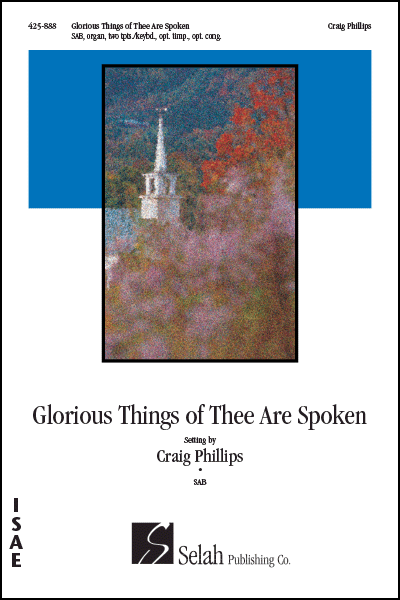|
Composer
Craig Phillips
Text John Newton, 1779
Voicing SATB, organ, 2 tpts./kybd., opt. timp., opt con.g
Topic Church and Mission, Church Triumphant, Eternal Life, New Heaven and Earth
Length 4' 45" Price $2.75 (U.S.)
Released 5/00
Cat. no. 425-888
Difficulty Mod. Easy
Discography Fill the World with Loudest Praise, St. Paul's Chamber Choir, Robert Brewer, conductor (Selah 520-425)
|
Order now!
Order PDF download!
Min. of 5
Other editions 425-889-Cond. Score/Inst. parts
Order now!


Order PDF score now!


Description
This setting of Haydn's tune AUSTRIA gives even smaller choirs the chance to make a big impression. The hymn tune is presented in straightforward fashion in the first and last stanzas, while the middle verses are more developed rhythmically and harmonically. The choral writing remains singable and effective throughout. Although written for SAB, organ, and two trumpets, with optional parts for timpani and congregation, if trumpeters are not available, that part may be played on a separate keyboard, thus enhancing the work's flexibility and usefulness.
History of the hymn
John Newton (17251807), the author of "Glorious Things of Thee Are Spoken," was among the most influential Evangelical Anglicans of his day. A contemporary of the Wesleys, Newton learned the Bible at his mother's knee but abandoned the faith and opted for the life of a sailor. After many adventures in Africa, he experienced a profound conversion, was ordained an Anglican priest, and accepted a curacy at Olney (1764). There Newton wrote hymns and enjoyed the friendship of the troubled but brilliant hymn writer and poet, William Cowper ("There Is A Fountain Filled With Blood"). In 1779, Newton and Cowper published some of their hymns in Olney Hymns. Animated by the evangelical piety of its authors, this three-part collection featured hymns on scripture, "occasional subjects" and the Christian life. Included in Book I (and exceptional in the collection because of its jubilant tone) was "Glorious Things of Thee Are Spoken" which carried the title "Zion; or, The City of God." Newton built this hymn around seven biblical passages. It quickly gained popularity wherever English-language hymns were sung.
The wide circulation of his autobiography detailing his sins as a slave trader and his dramatic conversion enhanced Newton's popularity as a hymn writer. Gifted with rich imagination and a thorough knowledge of scripture, this author of "Amazing Grace" and "How Sweet the Name of Jesus Sounds" helped introduce the singing of hymns into Anglican parish practice
"Glorious Things of Thee Are Spoken" has been adapted by both English and American hymnal editors. The original text is generally maintained, but the hymn is often shortened in American hymnals by the rearrangement of lines or by the omission of Newton's fourth stanza:
Blest inhabitants of Zion,
Washed in the Redeemer's blood!
Jesus, whom their souls rely on
Makes them kings and priests to God.
'Tis his love his people raises
Over self to reign as kings
And as priests, his solemn praises
Each for a thank-off'ring brings.
Newton's text is inextricably linked to AUSTRIA, an immensely popular tune by the Austrian composer Franz Josef Haydn. Composed in 1797, this "Volkslied" by Haydn, Chapel Master to the Austrian Emperor Franz Josef, was dedicated to the emperor and first performed on his birthday, February 12, 1797. It set to music a patriotic prayer, "Gott erhalte Franz den Kaiser," by Lorenz Leopold Haschka (17491827) modeled on "God Save the King." In this era of the French Revolution, the rise of Napoleon and growing nationalism, Haydn's tune filled a felt need for a rousing Austrian national anthem. England had its national hymn; France had adopted the Marseillaise as its anthem in 1795. Haydn gave Austria its counterpart.
Haydn originally wrote AUSTRIA as a single line for piano accompaniment. Later in 1897 he expanded the accompaniment for a small orchestra. AUSTRIA met instant success. It had dignity and hymnic resonance, and it galvanized the Austrian people at a moment of political turmoil. Germany later adopted AUSTRIA for its national anthem, and Haydn embedded the tune in one of his most enduring Quartets, "The Emperor."
By 1802, AUSTRIA had been appropriated by British and American compilers as a hymn tune. In 1804, it appeared in a hymn tune book published in Germany. Within five years of its composition, then, this inspiring patriotic masterpiece became part of the musical heritage of the Christian church. Although it is occasionally used with other words, "Glorious Things of Thee Are Spoken" remains AUSTRIA's most popular text.
|
|


Anthem text
Glorious things of thee are spoken, Zion, city of our God;
he whose word cannot be broken formed thee for his own abode;
on the Rock of Ages founded, what can shake thy sure repose?
With salvation's walls surrounded, thou may's smile at all thy foes.
See! the streams of living waters, sringing from eternal love,
well supply thy sons and daughters and all fear of want remove.
Who can faint, when such a river ever will their thirst assuage?
Grace, which, like the Lord, the giver, never fails from age to age.
Round each habitation hov'ring, see the cloud and fire appear
for a glory and a cov'ring, showing that the Lord is near.
Thus deriving from their banner, light by night, and shade by day,
safe they feed upon the manna which he gives them when they pray.
Blest inhabitants of Zion, washed in the Redeemer's blood!
Jesus, whom their souls rely on, makes them kings and priests to God.
'Tis his love his people raises over self to reign as kings:
and as priests, his solemn praises each for a thank offering brings.
--John Newton, 1779 |



